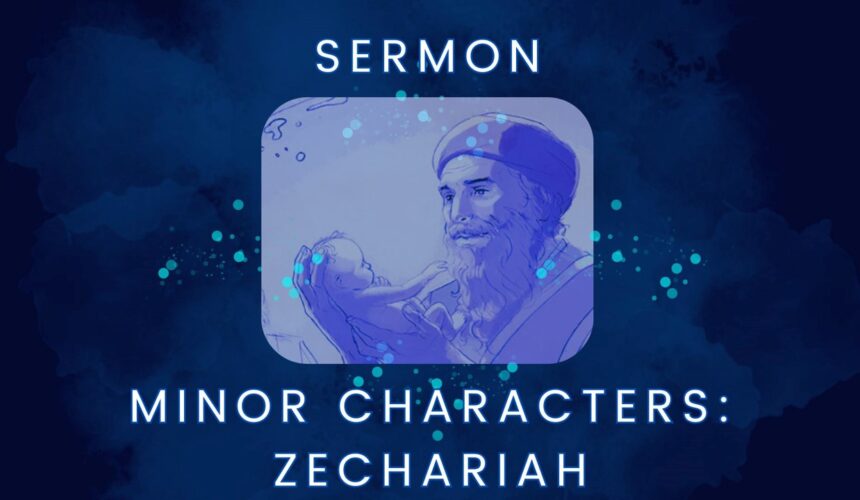December 22, 2024
Luke 1:57 – 66
Does anyone remember the controversy around the statue of Martin Luther King Jr. that was dedicated in Washington D.C. in August of 2011? Actually, I guess there were two controversies. One was that one of the inscription on the monument was supposed to be a quotation from King, but when they unveiled the statue, the quote was actually something King didn’t say. So that was embarrassing, and you have to wonder how it got past the proofreaders. But luckily it wasn’t too hard to fix. They just took the first quote off the statue and chiseled a new one in and that solved the problem.
But a lot of people pointed out something else that, at least for me, seemed like a much bigger issue. The statue is entitled “A Stone of Hope from a Mountain of Despair.” It shows King emerging from this unformed rock, as if he was sort of stepping out of a mountain all by himself. But people who knew King, his friends and people who marched with him and spent time with him, argued that King didn’t just emerge all alone from nothing, from some unformed granite of history, and he certainly didn’t believe that about himself. He knew perfectly well that his leadership was only possible because of all the people who had come before him and all the people who worked with him: Howard Thurman, for example, who studied nonviolent resistance with Gandhi in India and founded one of the first racially integrated churches in the country, who then taught King at Boston University; Bayard Rustin, the principal organizer of the March on Washington in 1963, where King gave his famous “I Have a Dream” speech; Rosa Parks, who had been a deeply committed activist with the NAACP for 10 years before she famously refused to give up her seat on a Montgomery Bus. And we could list hundreds more. King didn’t emerge out of nowhere any more than any of us do. We never accomplish anything alone. We are who we are, we accomplish what we do, because of the people who help shape our lives and support us and lift us up.
Now the Bible obviously has major, heroic characters. God, for one. And I think a lot of Christians would probably say that Jesus is the major character in the Bible. Then there are people like Moses, and Elijah, and the Apostle Paul, and King David and King Solomon. The Jewish Queen Esther has a whole book named after her. So does the Moabite woman Ruth. So it’s not like there are no significant, influential characters in the Bible.
Over the past few weeks, though, we’ve been looking at people I’m calling “minor characters.” Because there’s a pattern that crops up in Biblical storytelling: over and over again in scripture, the story of God’s work and God’s people depends on the actions of some minor character, somebody we know almost nothing about, who shows up for a few sentences out of the entire Bible, and then just sort of disappears.
Like I said a few weeks ago, in one way the Bible is the story of God’s people. It begins at creation, and continues to the original covenant between God and Abraham, to slavery in Egypt, to the escape from slavery and entering the Holy Land, to being conquered by powerful Empires, to the beginnings of the Christian movement, all building to God’s final triumph in the Revelation to John, the Bible’s final book. (Spoiler alert: the good guys win, the bad guys lose, everything turns out OK in the end.) But repeatedly throughout scripture, that entire story hinges on the actions of people we know almost nothing about, whose story is contained in a few sentences, and who we never hear from again.
Over the past few weeks, I’ve mentioned some of those people: the brave Hebrew midwives Shiphrah and Puah, who refuse to carry out the Egyptian King’s genocidal orders to kill Hebrew children. Lydia, the woman who works with Paul and Timothy to start the new church at Ephesus. The Pharoah’s daughter, whose name we never even know, who raises Moses as her own son when his mother has placed him in a small floating basket on the Nile river to save his life.
I think all this feature of the Biblical narrative is not an accident. I think there’s a message in it for us.
We live in a time when we can easily feel powerless, like our actions don’t make any difference. But one important thing about these minor characters in the Bible is not just that the whole story depends on them. It’s also that they probably don’t know it. They’re just showing up to their life and doing the next faithful thing. They have no idea what the results of that faithfulness will be. And I think that’s the message for us. We’re mostly not vastly wealthy or powerful or influential. But we can show up to our lives. We can cultivate awareness of God in the reality that’s right in front of us in every moment. We can respond faithfully in those moments. And who knows what God might be able to do with that?
So this “Minor Characters” series has focused on the Christmas story, because it’s that time of year. We started by looking at Joseph. Joseph shows up briefly in the Gospels of Matthew and Luke. His name is mentioned one time in the Gospel of John, and he doesn’t appear at all in the Gospel of Mark. But Joseph makes a crucial and definitive choice. Mary, the woman to whom he’s engaged, is suddenly pregnant, and neither Joseph nor anyone else in his small town knows who the dad is. He can do the respectable and decent thing; in fact, Matthew tells us he’s just about to do exactly that. He can call off the engagement, not make a big deal out of it, just let things go and move on. Or he can expose himself to the gossip and dishonor and mockery that would surely arise in that culture if he marries a pregnant woman and raises her son as his own. Given that choice, he chooses to do the harder thing and follow God. Like I said that week, Joseph’s specific choice is not one we’re likely to have to make. But the choice of whether to take the socially lauded path or to follow God by taking the harder road? That comes up all the time.
The second week of the series, I talked about Elizabeth. Elizabeth, like Joseph, is hardly mentioned in scripture. We know she’s an older relative of Mary’s. And like Mary, she’s pregnant – her child will become John the Baptist, the famous desert spiritual leader who tells people about the coming of the promised Messiah. Elizabeth is the wife of a priest in a small town. She probably has a certain social standing, a certain respectability. And Mary comes to her for refuge. Mary is a peasant girl, unmarried and pregnant. She has no social standing. In fact, she is in danger. In that culture, an unwed pregnant woman was believed to have brought shame on her family. She could be ostracized, thrown out of her home, maybe even stoned to death. So Elizabeth, like Joseph, is faced with a choice: she can view Mary the way the world sees her, as a dishonored person that many people would simply shun. Or she can see Mary in the almost unbelievable way that God sees her: as the young woman chosen by God to give birth to the Messiah. Elizabeth chooses to see Mary as God does, and she welcomes Mary into her home. And in that sense, this too is a story about choices we can make. We can view people the way our culture views them – or we can try to see people as God sees them.
There’s a third character in that story (or maybe a fourth, if we count God, who’s certainly involved), and that’s Elizabeth’s husband Zechariah. Like Joseph and Elizabeth, we never learn much about him. We know he’s a priest. Luke says tactfully that he’s “getting on in years,” so we don’t know his age, but he’s up there. We know he and Elizabeth have no children, and Luke tells us they’re both “righteous,” in the Gospel’s words, “living blamelessly before God.” Apart from that, we don’t know a thing about this guy.
So one day, he’s doing priest stuff in the temple, burning incense at an altar all by himself, and an angel appears to him and tells him that his wife will soon be pregnant. When he points out that maybe she’s a little old for this, the angel tells him that because he doubted, he will be unable to speak until his son is born – which seems a little harsh to me, but I guess it wasn’t my decision to make. I guess it’s one way of making sure he’s a minor character in the story, because from that moment until after his son is born, he doesn’t have a single line of dialogue because he can’t talk. He just disappears.
For me, the key moment in this story comes when John is born. Jewish tradition at the time was to name a child on the 8th day of life. So when they get to the eighth day, all the family and friends gather around and suggest to Elizabeth that the child should be called Zechariah, after his father.
I think this is a beautiful moment in the story, because naming a son after his father was not a common practice in Israel at the time. So I think the family’s suggestion says something about Zechariah. We know he’s a priest and he’s descended from a family of priests. He’s respected for his decency and integrity and faith. My guess is that his family and friends think very highly of him. They hope that his son will follow in his footsteps and be the kind of man his father is. So they suggest naming the boy after him.
But somehow, Zechariah knows that this child is not called to follow in his footsteps, as commendable and decent and honorable as those footsteps might be. Zechariah, still unable to talk, writes on a tablet that his son’s name will be John. Just like Joseph, just like Elizabeth, Zechariah makes a choice between what people might approve or want and what God calls him to do. He chooses not to have his son named after him, but rather to have John’s life point beyond the life of the family, even beyond the temple. Instead of a priest, John will be a desert prophet, announcing the coming of the Messiah.
The people gathered at Zechariah and Elizabeth’s home ask what seems to me to be the central question: “What then will this child become?” He won’t grow up to be like his dad. What will he be? I don’t think Zechariah knows. But I do think he’s willing to leave the answer to God. He’s willing to trust.
There’s a reason we still read these ancient stories. I think it’s because they’re not just stories about people thousands of years ago. They’re stories about us. In hindsight, it may seem that Elizabeth, or Jospeh, or Zechariah, or Lydia, or anyone else who moves God’s story forward; it may seem that their path was clearly laid out before them. It wasn’t. Their choices and their lives were just as murky and confusing as ours, maybe even more so.
Mary and Zechariah are visited by angels, which is not an overly plausible story to tell someone who wants you to explain your behavior. Not only that, but even after their angelic visitors pass God’s message to them, they both express doubt and ask questions anyway. Joseph has to make his decision based on God speaking to him in a dream. Elizabeth feels her baby kick inside her when Mary comes to her home, and takes that as a sign that Mary’s child will be the Messiah. Faithful living is not clear or straightforward. It’s not easy. You’ll question your own judgement and your own senses. Other people will question you too. But for me, the beauty in all of these stories is that God can use our simple acts of faith and kindness to redeem the world. We may never know how. But we don’t have to know how. We just need to show up to our lives and play whatever minor role is given to us. God will take care of the rest.


